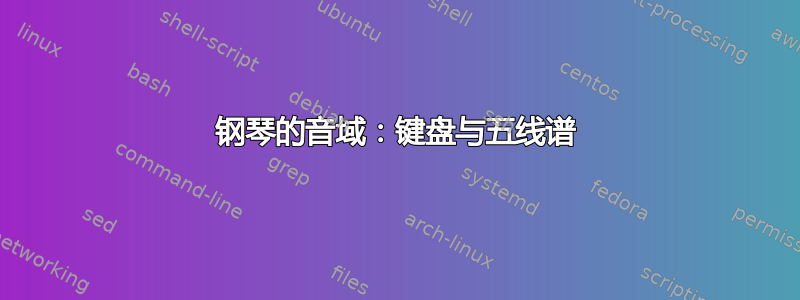
这是一种跟进这个问题。我想用 tikz 重现以下图像。

musictex我不知道如何“同步”和的输出tikz。也许我最好坚持使用,tikz但我不知道如何绘制逼真的音符、五线谱和键(借用它们musictex)?
以下是我目前在 tikz 中所做的事情。

\documentclass{standalone}
\usepackage{tikz}
\usetikzlibrary{positioning}
\begin{document}
\begin{tikzpicture}
\tikzset{%
White/.style = {%
node distance = 0cm and 0cm,
draw,
minimum width = .25cm,
minimum height = 1.25cm,
inner sep = 0pt},
Black/.style = {%
fill = black,
minimum width = .15cm,
minimum height = .75cm,
inner sep = 0pt,
anchor = north},
}
\node[White] (White--1-6) {};
\node[font = \tiny,above] at (White--1-6.north)
{$\mathrm{A}_{-1}$};
\node[font = \tiny,below] at (White--1-6.south)
{1};
\pgfmathsetmacro\frequency{round(440 * 2^(((1)-49)/12))}
\node[font = \tiny,above,rotate = 90,transform shape,anchor = west] at
(White--1-6.south) {\frequency};
\node[White,right = of White--1-6] (White--1-7) {};
\node[font = \tiny,above] at (White--1-7.north)
{$\mathrm{B}_{-1}$};
\node[font = \tiny,below] at (White--1-7.south)
{3};
\pgfmathsetmacro\frequency{round(440 * 2^(((3)-49)/12))}
\node[font = \tiny,above,rotate = 90,transform shape,anchor = west] at
(White--1-7.south) {\frequency};
\def\noteindex{4}%
\foreach \octave [remember = \octave as \lastoctave (initially -1)]
in {0,...,6}{%
\foreach \White/\note [remember = \White as \lastWhite (initially 7)]
in {1/C,2/D,3/E,4/F,5/G,6/A,7/B} {%
\ifnum\White=1\relax
\node[%
White,
right = of White-\lastoctave-\lastWhite]
(White-\octave-\White) {};
\else
\node[%
White,
right = of White-\octave-\lastWhite]
(White-\octave-\White) {};
\fi
\node[font = \tiny,above] at (White-\octave-\White.north)
{$\mathrm{\note}_{\octave}$};
\node[font = \tiny,below] at (White-\octave-\White.south)
{\noteindex};
\pgfmathsetmacro\frequency{round(440 * 2^(((\noteindex)-49)/12))}
\node[font = \tiny,above,rotate = 90,transform shape,anchor = west] at
(White-\octave-\White.south) {\frequency};
\ifcase\White\relax
\or% next is D
\xdef\noteindex{\number\numexpr\noteindex+2\relax}%
\or% next is E
\xdef\noteindex{\number\numexpr\noteindex+2\relax}%
\or% next is F
\xdef\noteindex{\number\numexpr\noteindex+1\relax}%
\or% next is G
\xdef\noteindex{\number\numexpr\noteindex+2\relax}%
\or% next is A
\xdef\noteindex{\number\numexpr\noteindex+2\relax}%
\or% next is B
\xdef\noteindex{\number\numexpr\noteindex+2\relax}%
\or% next is C
\xdef\noteindex{\number\numexpr\noteindex+1\relax}%
\fi
}
}
\node[White,right = of White-6-7] (White-7-1) {};
\node[font = \tiny,above] at (White-7-1.north)
{$\mathrm{C}_{7}$};
\node[font = \tiny,below] at (White-7-1.south)
{\noteindex};
\pgfmathsetmacro\frequency{round(440 * 2^(((\noteindex)-49)/12))}
\node[font = \tiny,above,rotate = 90,transform shape,anchor = west] at
(White-7-1.south) {\frequency};
\begin{scope}[every node/.style = {%
Black,
}]
\node at (White--1-6.north east) {};
\foreach \octave in {0,...,6}{%
\foreach \White in {1,2,4,5,6} {%
\node at (White-\octave-\White.north east) {};
}
}
\end{scope}
\end{tikzpicture}
\end{document}
答案1
没有得到适当的解决,但希望能展示如何“整合”(非常宽泛的意义上)musixtex和tikz。
编辑:添加了键盘和主音唱名法标签。不过还是有点乱。
\documentclass[border=0.25cm]{standalone}
\usepackage{etex}
\usepackage{tikz}
\usepackage{musixtex}
\usetikzlibrary{fit}
\begin{document}
\begin{tikzpicture}
\def\lastnotename{origin}
\newbox\notebox
\coordinate (origin) at (0,0);
\coordinate (stave) at (origin);
\foreach \octave [evaluate={\t=int(\octave*7-7);}] in {0, ..., 5}{
\foreach \pitch [count=\c from 0, evaluate={\x=int(\octave*7+\c+1);}] in {A,...,G}{
\ifnum\t>6
\tikzset{extract anchor/.style={anchor=south west, at=(\lastnotename.south east)}}
\else
\tikzset{extract anchor/.style={anchor=north west, at=(\lastnotename.north east)}}
\fi
\edef\notename{\pitch-\octave}
\node (\notename) [inner sep=0pt, outer sep=0pt,text width=1cm, extract anchor/.try] {%
\begin{music}
\instrumentnumber{1}
\instrumentnumber{2}
\nostartrule
\setstaffs1{1}
\setstaffs2{1}
\ifnum\x>1
\setclefsymbol1{\empty}
\setclefsymbol2{\empty}
\fi
\setclef1{\bass}
\setclef2{\treble}
\startextract
\transpose\t
\ifnum\t>7
\ifnum\t>14
\Notes \nextinstrument \ql{\pitch} \en
\else
\Notes \nextinstrument \qu{\pitch} \en
\fi
\else
\Notes \qu{\pitch} \en
\fi
\zendextract
\end{music}};
\xdef\lastnotename{\pitch-\octave}
}}
\node (stave) [fit={(A-0) (G-5)}] {};
\newif\ifblacknote
\foreach \octave in {0,...,5}
\foreach \pitch [count=\p, evaluate={\t={"la", "si", "so", "r\`e","mi", "fa", "sol"}[\p-1];}] in {A,...,G}{
\node [anchor=base] at ([xshift=0.25cm, yshift=-0.25cm]stave.south -| \pitch-\octave.south) {\t};
\draw ([xshift=0.25cm, yshift=-1cm]stave.south -| \pitch-\octave.south west) rectangle ++(1cm,-4cm);
\blacknotefalse
\ifcase\p
\or
\blacknotetrue
\or
\or
\blacknotetrue
\or
\blacknotetrue
\or
\or
\blacknotetrue
\or
\ifnum\octave<5
\blacknotetrue
\fi
\else
\fi
\ifblacknote
\fill ([xshift=0.25cm, yshift=-1cm]stave.south -| \pitch-\octave.south east) ++(-0.25cm,0) rectangle ++(0.5cm,-2.5cm);
\fi
}
\end{tikzpicture}
\end{document}

好的,这是一个更好的版本……
\documentclass[border=0.25cm]{standalone}
\usepackage{etex}
\usepackage{tikz}
\usepackage{musixtex}
\def\threedp#1{\pgfmathparse{#1}\expandafter\Threedp\pgfmathresult0000@}
\def\Threedp#1.#2#3#4#5@{#1.#2#3#4}
\begin{document}
\pgfdeclarelayer{blacknotes}
\pgfsetlayers{main,blacknotes}
\tikzset{tight fit/.style={inner sep=0pt, outer sep=0pt}}
\begin{tikzpicture}
\def\lastnotenodename{clefs}
\node [text width=1cm, tight fit] (clefs) at (0,0) {
\begin{music}
\instrumentnumber{1}
\instrumentnumber{2}
\nostartrule
\setstaffs1{1}
\setstaffs2{1}
\setclef1{\bass}
\setclef2{\treble}
\startextract
\hskip2.0\elemskip
\zendextract
\end{music}
};
\foreach \note [
evaluate={
\n=int(mod(\note-1, 12));
\octave=int((\note+8)/12);
\t=int(floor((\note-1)/12)*7-7);
\notename={"A","","B","C","","D","","E","F","","G",""}[\n];
\tonicsolfa={"la","","si","so","","r\`e","","mi","fa","","sol",""}[\n];
\blacknote={0,1,0,0,1,0,1,0,0,1,0,1}[\n];
\frequency=(2^((\note-49)/12))*440;}
] in {1,...,88}{
\ifnum\octave>3
\tikzset{extract anchor/.style={anchor=south west, at=(\lastnotenodename.south east)}}
\else
\tikzset{extract anchor/.style={anchor=north west, at=(\lastnotenodename.north east)}}
\fi
\ifnum\blacknote=0
\edef\notenodename{\notename_\octave}
\node (\notenodename) [tight fit,text width=1cm, extract anchor/.try] {%
\begin{music}
\instrumentnumber{1}
\instrumentnumber{2}
\nostartrule
\setstaffs1{1}
\setstaffs2{1}
\setclefsymbol1{\empty}
\setclefsymbol2{\empty}
\setclef1{\bass}
\setclef2{\treble}
\startextract
\transpose\t
\hskip-1.5\elemskip
\ifnum\octave>3
\ifnum\octave>4
\Notes \nextinstrument \ql{\notename} \en
\else
\Notes \nextinstrument \qu{\notename} \en
\fi
\else
\ifnum\octave>2
\Notes \ql{\notename} \en
\else
\Notes \qu{\notename} \en
\fi
\fi
\zendextract
\end{music}
};
\xdef\lastnotenodename{\notenodename}
\node [anchor=base] (sol-fa) at (\notenodename |- 0,-3) {\tonicsolfa$_\octave$};
\draw (\notenodename.south west |- 0,-4) rectangle ++(1, -4);
\node [rotate=90, font=\footnotesize, anchor=east]
at (\notenodename.north |- 0,-4) {\threedp\frequency};
\node [font=\footnotesize, anchor=south]
at (\notenodename.south |- 0,-8) {\note};
\node [font=\footnotesize, anchor=south]
at (\notenodename.south |- 0,-8.5) {\notename$_\octave$};
\draw (\notenodename.south west |- sol-fa.south)
rectangle (\notenodename.south east |- 0,1.125); %0.125 by trial and error
\else
\begin{pgfonlayer}{blacknotes}
\fill ([xshift=-0.25cm]\lastnotenodename.north east |- 0,-4) rectangle ++(0.5, -2.5);
\node [rotate=90, text=white, font=\footnotesize, anchor=east]
at (\lastnotenodename.north east |- 0,-4) {\threedp\frequency};
\end{pgfonlayer}
\fi
}
\node [rotate=90] at (0,-6) {Fr\`equency (Hz)};
\end{tikzpicture}
\end{document}



